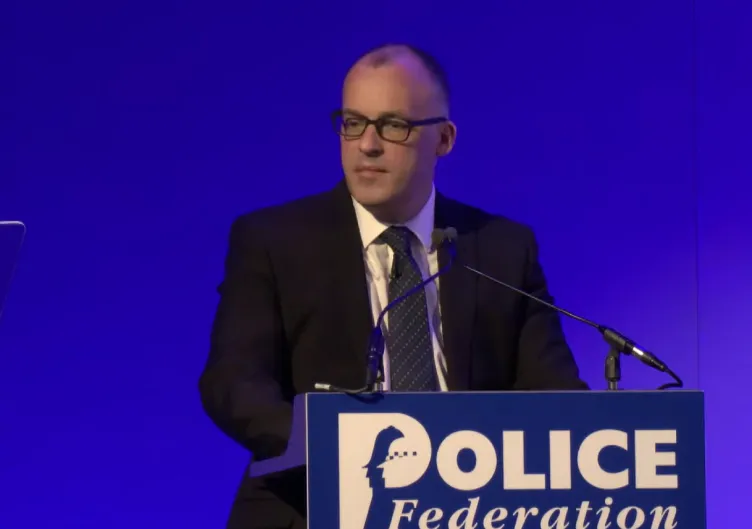
PFEW secretary John Partington
As policing continues to face unprecedented challenges, the Police Federation of England and Wales (PFEW) used its annual conference to underline the urgent need for reform.
Following Tiff Lynch’s opening address, delegates heard an equally powerful call from PFEW secretary John Partington, who highlighted critical issues spanning pay, conditions, recruitment, and officer protection.
Addressing colleagues, John emphasised that policing now requires a louder, unified voice to advocate for fairness, transparency, and the long-overdue recognition of the responsibilities carried by officers across England and Wales.
John explained that over the past year, the Federation has made significant progress toward greater transparency and member engagement. For the first time, members received full sight of the final pay offer before a decision was made – a change the Federation described as ‘how it should be: a two-way conversation, not a closed-door process’.
He said that evidence and advocacy presented by the Federation contributed to a 4.2 per cent pay rise, increases to allowances, improved overnight and hardship payments, and a commitment to address critical issues such as compensation for extra hours worked, shift disturbance, and detective burden.
Later on, John discussed the urgent need for comprehensive, standardised psychological testing for all police recruits across England and Wales. He stressed that policing is among the most regulated professions in the UK, yet recruitment standards vary widely. Psychological testing, he argued, should be “a safeguard, not an optional extra,” ensuring candidates possess the temperament, values, emotional readiness, and resilience required for modern policing.
He added: “We know what happens when the wrong people get through the door. This cannot happen again. The public deserves officers who are not only capable but also have the integrity and emotional strength to uphold the core principles of the job. This job isn’t for everyone. It demands resilience, empathy and strength. These qualities can’t be assumed, they must be tested.”
Delegates heard stark warnings about worsening financial pressures on frontline officers, including rising housing, energy, food, and fuel costs that have far outpaced police pay, leaving many officers struggling to meet basic household expenses. John highlighted the inequity of equal-percentage pay awards, which disproportionately impact lower-paid officers.
He said: “A superintendent and a constable face the same inflation, but not the same reality. Percentage-only rises deepen inequality. Without correction, policing will become unaffordable for the very people who make it work.”
John confirmed that the next pay submission will argue for targeted increases that recognise the unique pressures facing frontline ranks. Discussing the current pay review body, he argued that the system is “not fit for policing,” citing political constraints and lack of independence. To ensure fairness and remove political interference, the Federation is calling for a move toward collective bargaining and binding arbitration.
An Early Day Motion has been submitted in Parliament, with cross-party support, and the Federation is exploring legal avenues and international labour law implications.
John ended: “Keep underpaying, undervaluing, and overloading officers, and more will leave permanently. This government is pushing policing toward a crisis unless urgent action is taken. Policing demands deep knowledge, emotional strength, and the courage to hold the line when everything else gives way. Officers deserve pay, conditions, and pensions that reflect that burden. We are not asking for special treatment – we are asking for fairness.”
Day one also included discussions on supporting officers’ families, and a keynote speech and Q&A with PFEW chief executive Mukund Krishna.
Presentations for the Outstanding Contribution to Women in Policing Award, and the Detective of the Year, were also given.
Tomorrow’s sessions start at 9.20am and includes a keynote speech from Tiff.
There will be a panel discussion on policing’s suicide crisis, an update on the #SimplifyDG6 campaign, and a panel Q&A.
Awards for Investigation of the Year and Response Officer of the Year will be presented as well.
You can re-watch today’s sessions and tune in live tomorrow via the PFEW YouTube channel.
